Newsletter
OUR NEWSLETTERS
If you would like to be added to our newsletter email distribution list please email sseswmedia@qub.ac.uk.
Welcome to the Summer 2025 newsletter from the School of Social Sciences, Education and Social Work (SSESW) at Queen’s University Belfast.
Our work aims to make a difference, through preparing SSESW students to become active citizens and high quality professionals across a range of careers and through research that generates positive impact for people, communities and policy in local, national and global settings. The newsletter highlights some key moments from across the School. We would love to hear from and work with you so do get in touch if you are interested in our activities across Criminology, Sociology, Social Policy, Education and Social Work.
Professor Daniel Muijs
Head of School of Social Sciences, Education and Social Work

After a period of review and redevelopment, the School of SSESW is delighted to confirm that our new postgraduate programme for child and family social workers launches in September 2025. The MSc/PGDip/PGCert in Advanced Social Work with Children, Young People and Families builds on the strengths of our former Children and Families pathway, which had been placed on pause to allow space for reflection and redesign. This came at a time when sector needs were shifting and enrolment patterns indicated the value of a more flexible, practice-oriented model.
The redesigned programme offers a part-time structure over two to three years, with clear alignment to the Professional in Practice (PiP) framework. Completion of Year 1 meets Consolidation Award requirements, Year 2 supports the Specialist Award, and the final MSc year aligns with the Leadership Award. Two bespoke systemic practice modules will also allow students to gain Foundation-level accreditation with the Association of Family Therapy and Systemic Practice UK.
Updated content reflects current practice priorities - covering areas such as assessment, risk, parenting capacity, child participation and service development. Modules will be delivered by members of our Centre for Child, Youth and Family Welfare, alongside experienced external tutors supporting systemic skills and reflective practice.
This programme marks a renewed commitment to supporting professional development in child and family social work - meeting workforce needs, supporting staff wellbeing and ultimately improving outcomes for children and families.
Programme Director, Professor Lisa Bunting said:
“A huge thanks to everyone who contributed to the redevelopment process. This has been a genuinely collaborative effort involving School of SSESW colleagues, the Queen’s University Centre for Child, Youth and Family Welfare, and key external stakeholders including the Northern Ireland Social Care Council, Health and Social Care Trust Learning and Development teams, and frontline practitioners. Applications are open now and we look forward to welcoming the first cohort of students in September.”
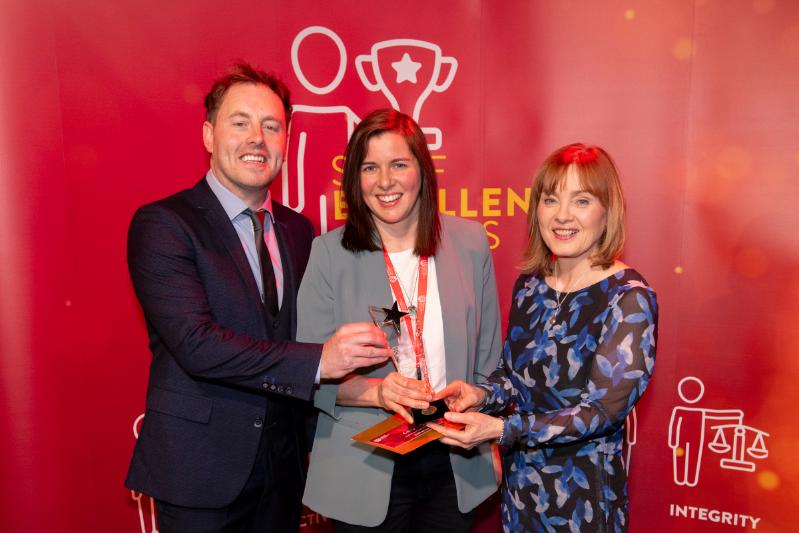
I have been married to my husband and best friend, Tim, for 13 years. I completed my undergraduate degree in Music at Queen’s University Belfast, followed by a Master’s at Ulster University in Teaching English to Speakers of Other Languages. I spent 10 years teaching academic English and study skills at INTO, Queen’s, to support international students, before transitioning in 2019 to a career in Educational Technology support at Queen’s.
I work as a Digital Learning Developer, collaborating with incredible staff and students, and won the University’s Staff Excellence Award 2025 for ‘delivering excellence’. When I saw an opportunity for PhD study at the School of SSESW, I was drawn not only to the topic but also to the chance to work with my supervisor, Dr Sultan Turkan. Although stepping away from a full-time role I love wasn’t easy, the conversations with students in my network, the doctoral study interview process and my eventual acceptance made it feel like the right decision.
My PhD is on ‘Responsible use of Artificial Intelligence for the development of virtual teacher learning environments for teachers and coaches of bilingual learners in Northern Ireland’ and is a perfect combination of my professional experience and interests. Many years had passed since my Master’s, so I felt a bit out of study practice, but with training from the Graduate School, the School of SSESW, Skills Assistants and the McClay Library, I feel fully supported at Queen’s to achieve my potential as a mature student.
Managing the Digital Champions and Student Skills Assistants teams, I saw first-hand how committed the University is to supporting student development and promoting the student voice. The Student Skills Assistants continue to be one of the best initiatives around campus, offering advice and support ‘for students, by students’ and insights on student life, academic skills or any questions students might have as they settle into Queen’s.
I love being a student again at QUB! The PhD student community in the School of SSESW is incredibly welcoming and supportive. Dr Alison MacKenzie provided an excellent induction and continues to facilitate an open and inclusive environment in SSESW. The Research Office team are always available to answer questions (of which I have many!) and the School’s PhD training programme, which draws on the expertise of its academic staff, is an amazing idea which offers invaluable support throughout the doctoral study journey.
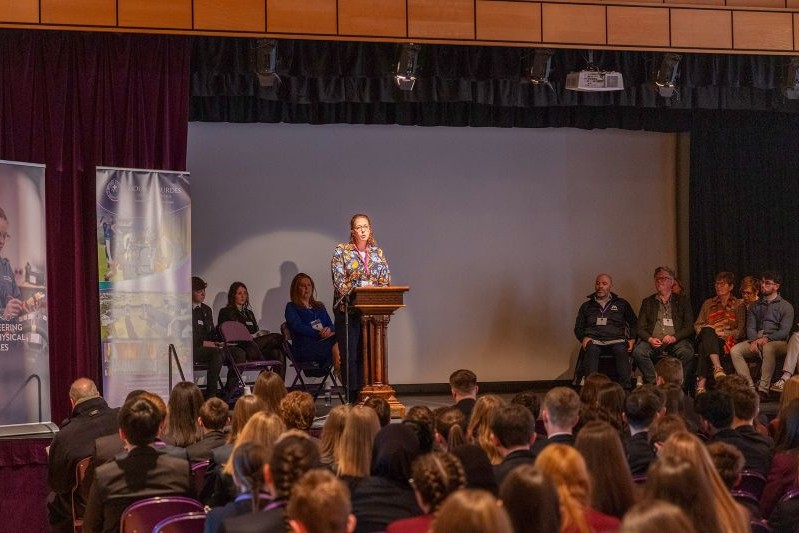
Academic Hazel Khamanra was delighted to see the successful culmination of numerous important partnerships at a highly successful Sustainability Conference. The event in March, hosted at Mount Lourdes Grammar School in Enniskillen, brought together over 250 fourteen-year-olds from four local schools who took part in a variety of engaging sustainability related workshops.
The conference stemmed from relationships forged through a research project led by Hazel, aimed at educating both pre-service and in-service teachers about sustainable energies. The work with teachers was facilitated by the Centre of Advanced Sustainable Energy (CASE) at Queen’s University under the leadership of director Martin Doherty. Inspired by their experiences, teachers from Mount Lourdes were eager to share their newfound knowledge with their students and those from nearby schools.
The conference was funded and supported by CASE along with a number of volunteer presenters. Students were actively involved in designing and shaping every aspect of it. They learned about sustainable energies and delved into sustainable tourism, agriculture, social action, textile waste reduction, water pollution testing, biochar applications, waste product utilization and health monitoring in sustainable homes.
A significant business meeting took place during the conference, bringing together local principals, students, council representatives and industry leaders. They met with representatives from the Education Authority and the Council for the Curriculum, Examinations, and Assessment to discuss collaborative efforts between education and industry in achieving sustainability goals.
The student feedback was overwhelmingly positive, with participants agreeing that the event further generated their interest in sustainability, and they would now consider a career in a sustainability related field.
Dr Hazel Khamanra said:
“This event underscored how sustainability transcends individual subjects and must be integrated into every facet of education. The key takeaway for me is that forming partnerships to work towards sustainability goals brings immense strength and achievement.”
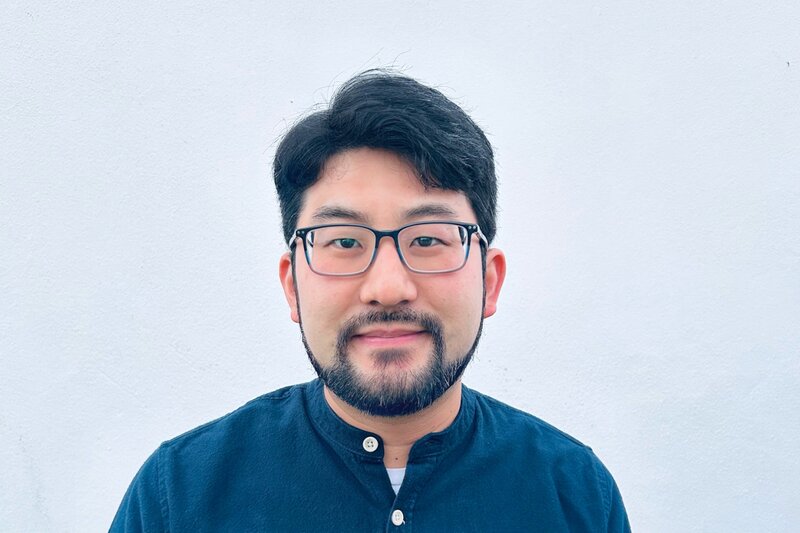
I am a cultural sociologist of violence. My research straddles multiple areas including cultural sociology, political sociology, memory studies, sociology of religion and social theory. I’m interested in how individuals, groups and institutions make sense of violent events. I research how actors engage in meaning-making processes through narratives and how different stakeholders construct multiple and conflicting accounts of the same event.
I joined Queen’s as Lecturer in Sociology in 2021. Previously, I was British Academy Postdoctoral Fellow at the University of Cambridge (2017-21), where I also completed my PhD in Sociology (2017).
For the past few years, I have been researching atrocity denial by the Japanese far-right and I also have a developing research project on Myanmar's official denial of the Rohingya Genocide.
My first monograph, Aum Shinrikyo and religious terrorism in Japanese collective memory, reconstructs the long-term consequences of Aum Shinrikyō’s crimes and terrorist attacks that culminated in the deadly sarin gas attack on the Tokyo subway in March 1995. The book shows that using moral opposites like ‘good-evil’ and ‘victims-perpetrators’ in commemorative processes can ultimately hinder social repair and reconciliation.
I am a co-editor of the journal Cultural Sociology. For the journal, I am currently working with Prof Ming-Cheng Lo (UC Davis) on a special issue titled ‘Cultural Sociology of War’, which examines the role of culture (broadly defined) in moral struggles about wars and the consequences of war.
I currently convene the following Sociology modules: SOC1005 Digital Society (Level 1 core) and SOC3054 Cultural Politics of Memory and SOC9081 Power, Agency and Global Inequalities.
In my free time, I split my time between playing musical instruments, cooking, and playing video games. I’m an avid amateur musician and play drums as my main instrument. I also started playing the organ a few years ago. I like to cook all kinds of cuisine, but I especially enjoy cooking Japanese dishes which are harder to find in Belfast. I’m a fan of single-player games like Super Mario Bros, The Legend of Zelda & Dark Souls.
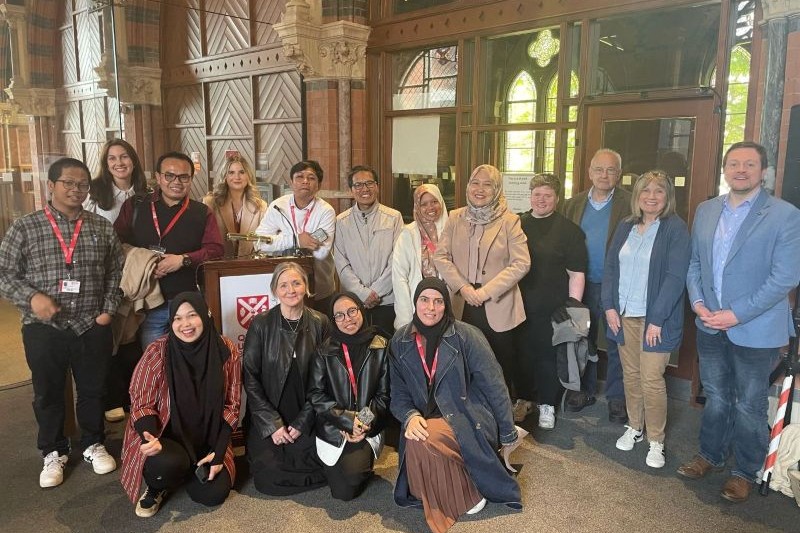
Our MScTESOL & Applied Linguistics students headed off on field trip in March to Derry/Londonderry. The trip involved opportunities to experience the place, its history and its stories, and to meet local people. The students saw the wonderful Guild Hall and the famous Derry Girls Mural, and heard a brilliant talk on community education initiatives in the north west of Northern Ireland.
In April we held a Centre Showcase (pictured) to highlight and share our work with Queen’s University staff and students. We held a series of short talks by Centre staff and students, an artefact display with our books and publications, and a research seminar on Language Trends in the UK. It took place in the University’s beautiful Graduate School building and was attended by QUB staff and students, community collaborators, and visiting academics. With special thanks to Dean of the Graduate School, Professor Colin McCoy who came to visit us during our coffee break!
Ibrar Bhatt received a Leverhulme Research Project Grant to investigate ‘heritage literacy’ in Hong Kong and the Greater Bay Area. He will lead a two-year study with Dr Lee-Shan Tse (Cambridge University Anthropology graduate and Evans Fellow), conducting sociolinguistic fieldwork on how heritage is adapted and maintained in the region’s Muslim communities. This is Ibrar's third research grant utilising heritage literacy, a concept he has developed in recent work.
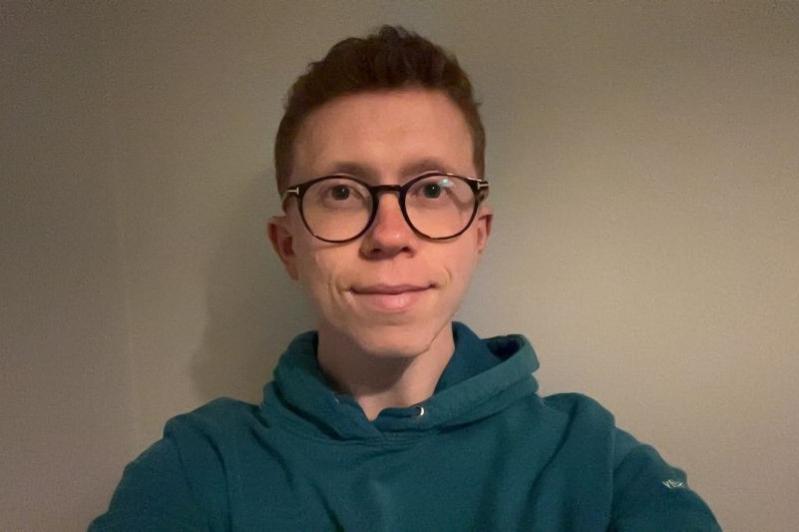
Why did you decide to study at Queen’s University?
I studied Psychology at undergraduate level at Queen’s University prior to undertaking the degree in Social Work. Due to a really positive undergraduate experience, I wanted to pursue the Social Work degree at the same university.
Which course did you take and why?
I undertook the Relevant Graduate Route. It was an advantage that this took two years to complete and it was appealing that you would benefit from completing a placement each year.
Tell us a little about yourself.
I wanted to become a Social Worker since I was in school but I felt I wanted more life experience first. When I was studying Psychology, I loved studying issues related to Social Work in Social Psychology, including prejudice, and this cemented my wish to pursue a career in which these issues could be actively challenged.
What was your experience of the course and the School of SSESW?
I really loved the course and studying within the School of SSESW. The topics we studied were interesting and it was great to apply the knowledge we gained when on placement. The staff are amazing. They are so informative about their field of expertise, but also are supportive and kind which made a big difference.
What was your experience of the facilities and support at Queen’s?
The library is amazing and has everything you need for a good university experience.
How did you find the student experience at Queen’s?
There are so many clubs and hobbies you can get involved in which heightens your student experience. Everything was well organised and there was good communication from the University.
Were you involved in any additional university activities?
In the first year of my degree I was involved in the Social Work book club which was a really brilliant experience and I would recommend this to anyone.
How is your job going now that you’re in the workplace?
I love my job. I now work in an Older People’s Team in the South Eastern Trust. I completed my Assessed Year in Employment (probationary year) in Children’s Services. We get to work with people and make a difference every day. I always heard that Social Work is a challenging but a very rewarding career – and I can honestly say this is so true.
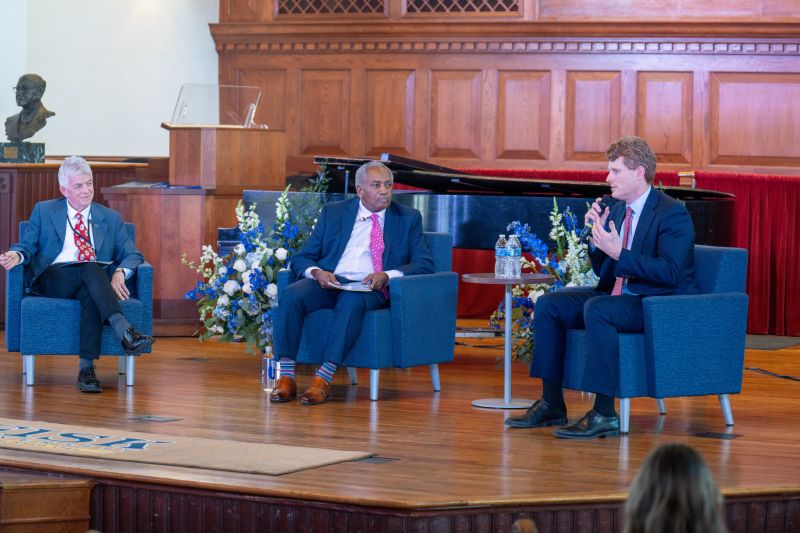
Queen’s University Belfast collaborated with Belmont University and Fisk University (both Nashville) on the Peace Summit 2025, held in February in Nashville. School of SSESW academic, Professor Joe Duffy (left) spearheaded the idea for the Peace Summit to reflect on the interface between peacebuilding and civil rights.
The event highlighted the shared struggles and triumphs of Sister Cities, Nashville and Belfast, both of which have been shaped by their deep histories of conflict and resilience in the pursuit of civil rights and peace.
From the Civil Rights Movement in Nashville over 60 years ago to the peace-building efforts in Northern Ireland, the highly successful Peace Summit provided a platform for dialogue, education and connection.
The event also coincided with the 30th anniversary of the Sister Cities partnership between Nashville and Belfast, with the Lord Mayor of Belfast, Councillor Micky Murray attending as part of a delegation from Northern Ireland, led by Belfast City Council.
Congressman Joe Kennedy III (right), former Special Envoy to Northern Ireland, participated in an in-conversation event with our Social Work colleague Joe Duffy and award-winning journalist Dwight Lewis (centre) at Fisk University, discussing the ongoing fight for civil rights and peace. He reflected on the civil rights issues of today, how his grandfather, Senator Robert F. Kennedy, and his great-uncle, President John F. Kennedy, campaigned for civil rights, as well as his own recent role as Special Envoy.
Professor Duffy commented:
''It is with immense pride I can now reflect on how my idea, first envisioned in January 2024, became a reality at the Peace Summit in Nashville. It was a personal highlight to interview Congressman Joe Kennedy III, Special Envoy to Northern Ireland 2022-24, alongside journalist Dwight Lewis about the path to civil rights in America and his reflections on peacebuilding in Northern Ireland.''
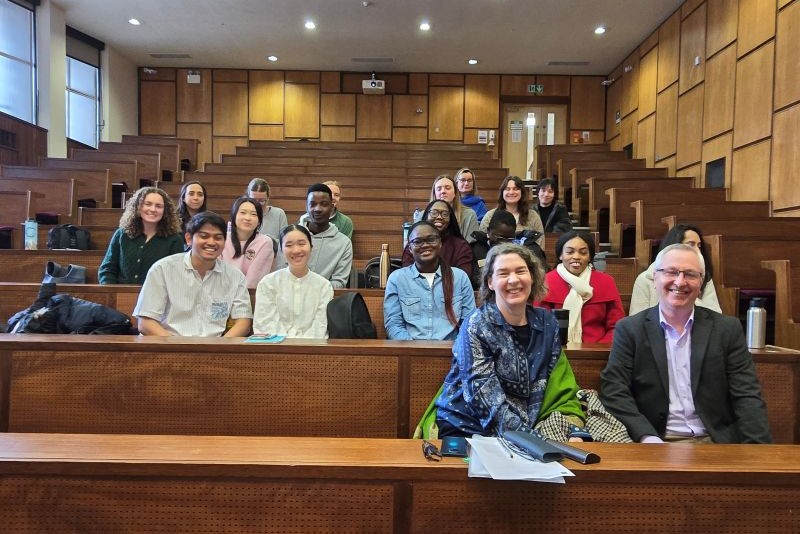
Social Work academic Michael Duffy, who specializes in cognitive therapy and is a globally recognized expert in the treatment of trauma, was invited to speak to a group of international students in March. They were from the USA, South Africa, India, China, Japan and a number of European countries. The students were visiting the Queen’s University Belfast Institute for Clinical Science located in the Royal Victoria Hospital, Belfast.
The annual visit to Belfast is a collaboration between the Centre for Public Health at Queen's University Belfast and the Centre for Global Health at Trinity College Dublin (TCD). Accompanied by academics from their MSc Global Health Studies programme at TCD, the international students come to Queen’s to learn from our research and clinical experiences in order to further their understanding of mental health as a public health issue in a post-conflict society.
Michael Duffy met last year’s visiting students and was invited this year to provide a lecture and a question and answer session on the long-term impact of conflict on mental health and ‘Treating Trauma Linked to Conflict’. The international students were from various disciplines including Medicine, Social Work, Psychology, Nursing and a number of other academic backgrounds so the group discussion was rich and came from a wide range of perspectives.
While in Belfast, the students took a black taxi tour of the city with a guide and learned in more detail about the history of and trauma relating to the decades of The Troubles in Northern Ireland.
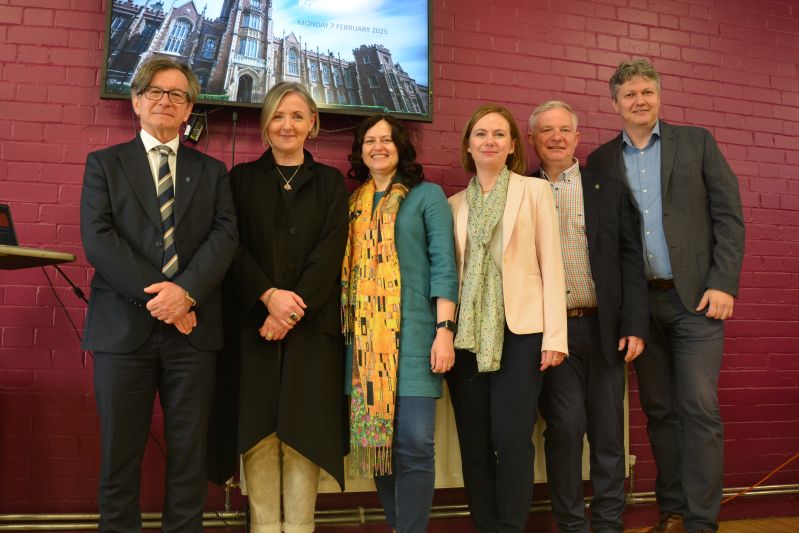
Our Centre for Language Education Research team hosted a visit to Queen’s University Belfast in April by a team of academics from Jagiellonian University in Kraków. The two groups shared knowledge and experiences of English language teacher training and education and discussed current trends in Teaching English to Speakers to Other Languages (TESOL) education and research. They also investigated opportunities for future cooperation in English language teacher education, including the potential for a joint student conference.
As Dean, Professor Władysław Witalis commented:
"I am certain this was the beginning of a cooperation that will benefit both institutions".
In a programme of activities organised by School of SSESW academic Aisling O’Boyle (Centre Director, second left), the Jagiellonian visitors heard more about the Centre for Language Education Research and the wider School including our MSc TESOL and Applied Linguistics.
Jagellonian colleagues met staff and students, attended a Centre research seminar and joined Centre teams on their outreach work in community contexts.
Speaking about the visit, Aisling O’Boyle noted:
"It has been great to share with international colleagues the work that we do in our programmes and research, and the environments that we have created with and for our students and community partners. Connecting with colleagues who care about the future we are creating now, and who forward think across local and global contexts, is always welcome."
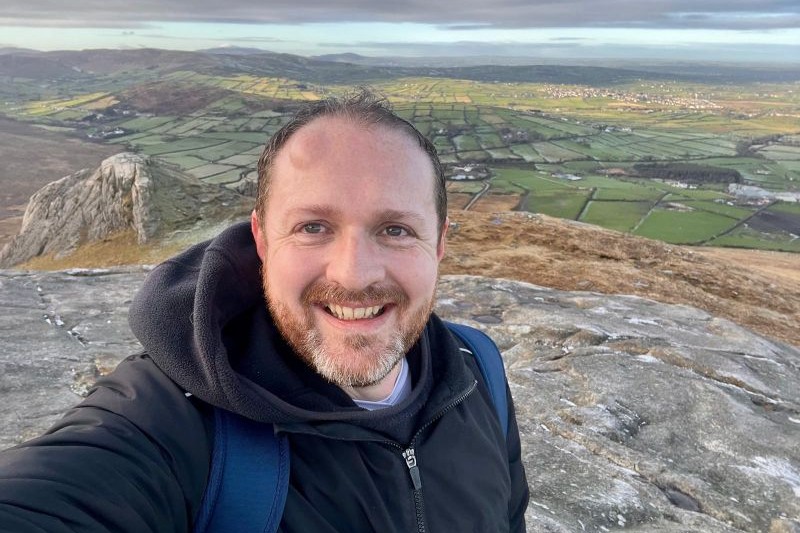
I joined Queen’s University in 2006 as a then Lecturer (Education) with the Open Learning Programme of short courses. My role was to develop the programme with non-traditional learners by developing and delivering short courses beyond the main Queen’s campus. This meant getting out and establishing new ties with community and youth groups, libraries and museums that would host Open Learning courses. This was something I really enjoyed given my previous background working in the community sector and as an Outreach Development Officer with a further and higher education college in Limavady. Indeed, I enjoyed it so much I came back for more!
In January this year, following a number of years away from Open Learning, I took up the role of Co-Director of the Programme along with my colleague Professor Katy Hayward.
Much of my teaching is in the area of Irish political sociology. My background is in Irish History and Politics which I studied at both undergraduate and postgraduate levels at Ulster University. I then made the controversial decision to switch allegiances to Queen’s University Belfast to complete my PhD with the Institute of Irish Studies. The focus of my research was contemporary Irish nationalism in the post-Belfast/Good Friday Agreement period, looking at how this compared with previous iterations by analysing efforts to promote and develop the Irish language.
Today my research focuses on nationalism more broadly, and currently I am looking at how nationalist politics is helping to drive a resurgence of the extreme right. In particular, I am exploring the strategies of the extreme right in Ireland and assessing how they use social media to broaden their appeal and reach new audiences.
Away from work I am a very big sports fan. As a native of county Tyrone I continue to follow the gaelic football fortunes of the county team. In soccer I have supported Manchester United for as long as I can remember…although currently I am trying to forget. Perhaps a little more unusually, I am also a fan of the San Francisco 49ers American Football team; something that often leaves me quite sleep deprived during the autumn/winter months.
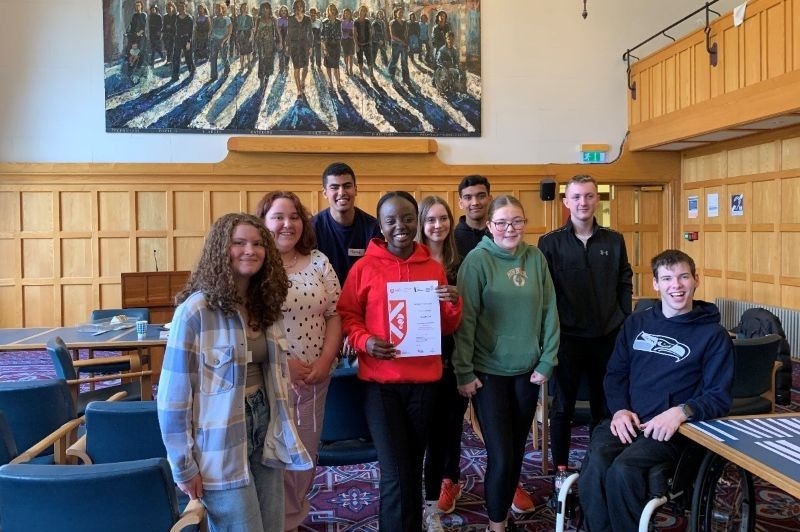
The Respect and Disrespect in Children and Adolescents’ Lives (RADICAL) project works with children and young people to enhance understandings and practices relating to respect. The first phase is complete, where two research advisory groups (Scouts Northern Ireland and Belfast City Youth Council) worked with the project team to develop a definition and theory of respect. This was used to inform the development of survey questions and data collection.
The project is managed by our Centre for Children’s Rights and funded by the Economic and Social Research Council. The team celebrated the end of phase one with a certificates event at Queen’s University. One participant commented:
“I really enjoyed my time so far as an advisor. I didn’t think such opportunities were available to young people until I joined RADICAL and I gained a lot of research knowledge and experience which would help me going forward in life. The reason why I joined RADICAL was simple, to help the world understand how young people would like to be respected.”
In the current phase, the advisory groups helped design questions for the Northern Ireland Kids Life and Times (KLT) survey of 11-year-olds and the Young Life and Times (YLT) survey of 16-year-olds, as well as tasks for group interviews of children and young people and for one-to-one interviews with other young people. They are also co-developing an ethics framework for doing research with children and young people. Some members of the advisory groups have been out with Centre colleagues, collecting data from other children and young people about understandings and experiences of respect and disrespect, and will contribute to analysing the data.
An update on respect sets the context for the research. The team will publish a follow-up research update with findings on children and young people’s understandings and experiences of respect and disrespect from the YLT and KLT 2025 surveys.

Social Work academics Mandi MacDonald and Berni Kelly were involved in teaching an international course on aftercare support for care-experienced youth. Students from Norway, Sweden, Finland and Germany came together in May for a week of intensive teaching at VID Specialised University in Olso, where they were taught by an international team of academics from University of Gothenburg, University of Helsinki, University of Turku and Queen's University Belfast, as well as VID colleagues.
The course is designed for international Masters' level students to enhance their understanding of how support for young people leaving care can be theorised, organized and delivered, drawing on competence across different countries. The course format combines collaborative international online learning with an intensive on-campus programme at VID.
Mandi delivered in-person teaching, drawing on her recent SSESW research that explores the importance of foster family for young adults and on a recent review, conducted with Nordic colleagues, on the meaning and experience of family for youth leaving care.
A key feature of the course was its combination of physical mobility with virtual learning, making it more accessible to students who may not be able to participate in longer-term exchange programmes. Berni Kelly gave the cohort an online lecture based on her extensive research with disabled care leavers with lessons learned from South Africa, Norway and Northern Ireland.
Students were at various stages in their social work careers and were able to connect the teaching to their particular role within child, youth and family welfare services. The course was a great success. The students especially highlighted the valuable insights into how care leaving is approached differently across countries.
The aim of the collaboration is that Social Work students from Queen's University Belfast will be able to join this Erasmus Blended Intensive Programme when it is hosted in University of Turku, Finland next year.
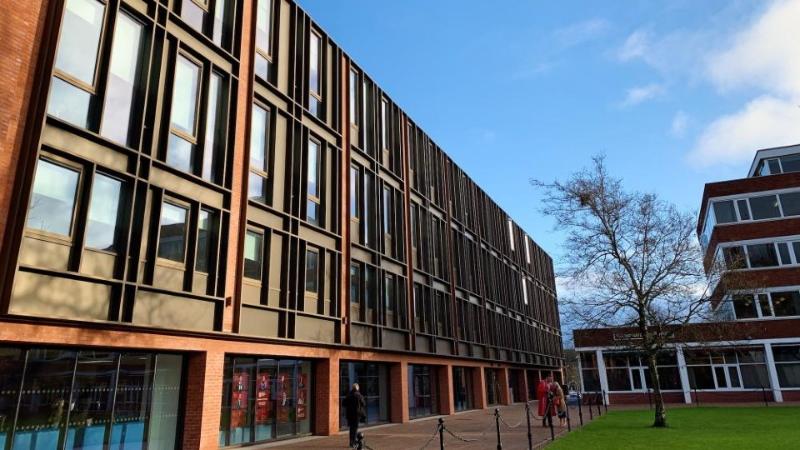
Just a few months after taking office, President Donald Trump’s policies have already had tumultuous effects on American society and the world. In a roundtable discussion at Queen’s University in April, leading US sociologists on race and racism reflected on these dramatic political and cultural changes taking place under the Trump administration.
The roundtable discussion was hosted and moderated by SSESW academic Rin Ushiyama and featured speakers Professor Nicole Fox from California State University Sacramento, Professor Kenneth Andrews and Professor David Cunningham, both from Washington University in St. Louis. Professor Cunningham is currently a Visiting Scholar at the the Institute for Global Peace, Security and Justice, Queen’s University.
Nicole Fox reflected on the changes taking place in her own institution and the state of California. Kenneth Andrews explored the different ramifications of the new policy environment on research and education, including how research funding bodies may be affected. He encouraged the audience to look at the wider higher education landscape across the US, rather than being focused on a small number of high-profile universities. David Cunningham discussed different ways in which US universities are supporting each other by creating new initiatives in the new political climate. He outlined how different groups such as professional associations and alumni can support academic freedom.
The discussion with audience members included questions and reflections about President Trump’s support base and what universities outside the US can do to collaborate with US-based academics. The roundtable discussion took place to a full audience and was well attended by staff and students, including students from Queen’s INTO foundational programme, which supports international students to prepare for undergraduate study.

The School of SSESW will host leading scholars on emotions sociology from across Europe and beyond at a conference on the Queen’s University Belfast campus this summer. The 11th Midterm Conference of the European Sociological Association Sociology of Emotions Research Network takes place at Queen’s from 26-29 August on the theme ‘Emotions in Post-/Conflict and Post-/Crisis Societies’. SSESW academic Jonathan Heaney, lecturer in Sociology and Advisory Board Member of the research network, is co-organizing the event. Jonathan says:
“I am delighted to bring so many wonderful international colleagues to Queen’s to present cutting edge work from the sociology of emotions. The conference theme will allow us to address the defining issues in the world today but from a sociology of emotions perspective. Conflict and crisis seem to be all around us, arousing strong emotions like fear, anger, hate and resentment which are being channelled by political leaders of the left and right in different ways all over the world. These are vitally important issues, and Sociology is very good at explaining these trends but I think more work is needed to analyse the emotional dynamics of post-conflict and post-crisis contexts. This conference in Belfast will provide a unique environment for us to consider this.”
In addition to research on the conference theme, there will be sessions on topics such as emotions and religion, politics, social movements, law, education, family and intimate lives, among others. Professor Siniša Malešević (University College Dublin), and Dr Isabel Bramsen (Lund University Sweden) will deliver keynote talks, while Dr Jonathan Heaney and Professor Mary Holmes (University of Edinburgh) will run a one-day PhD workshop to enable graduate students from across Europe to discuss their work and receive feedback. Further information is available on the conference website.
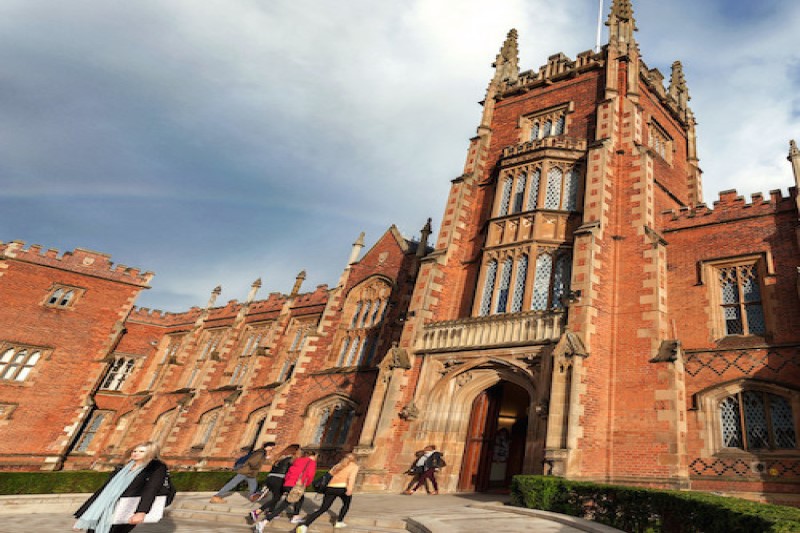
In January, Bronagh Byrne and Cate McNamee gave an invited presentation to the Department of Education (DfE) for Northern Ireland (NI) on findings from their research on the emotional well-being of deaf children and young people.
Dirk Schubotz and PhD student Megan Turner spoke at a Victim Support NI conference on ‘What we know (and don’t know) about children’s and young people’s online relationships and what we should (and should not) do about this’.
Laura Lundy was keynote speaker at the British Early Childhood Educational Research Association conference in Birmingham in February and invited speaker at an OECD expert meeting on child empowerment in Luxembourg in March.
The Centre launched its Incorporation Conversations series, a collaboration with the NI Commissioner for Children and Young People facilitating discussion on incorporation of the UN Convention on the Rights of the Child in Northern Ireland.
Centre colleagues, with Alice Diver (Law), received Commission for Victims of Crime funding to research Family Courts processes in NI. The team is working with a young person’s advisory group from the Social Action Youth project at Women’s Aid, exploring experiences of Family Courts in domestic abuse cases.
Bronagh Byrne has been commissioned by the Department for Communities to review the NI Families Sign project. Evidence gathered from the review will inform implementation of the forthcoming Sign Language Act.
Siobhán McAlister is working with Ulster University and young women from RCity Youth Project to co-design a resource to raise awareness of young women’s experiences of violence. The women spoke of their work at an event at Queen’s University to mark International Women’s Day.
Siobhán McAlister was invited to join the DfE Working Group on Ending Violence Against Women and Girls (EVAWG) in Tertiary Education. The group work on developing and overseeing interventions to prevent and respond to VAWG in higher education in NI.
In April, the Centre welcomed academics from University of Stavanger, Norway, who presented on their Participation in English Language Teaching project.
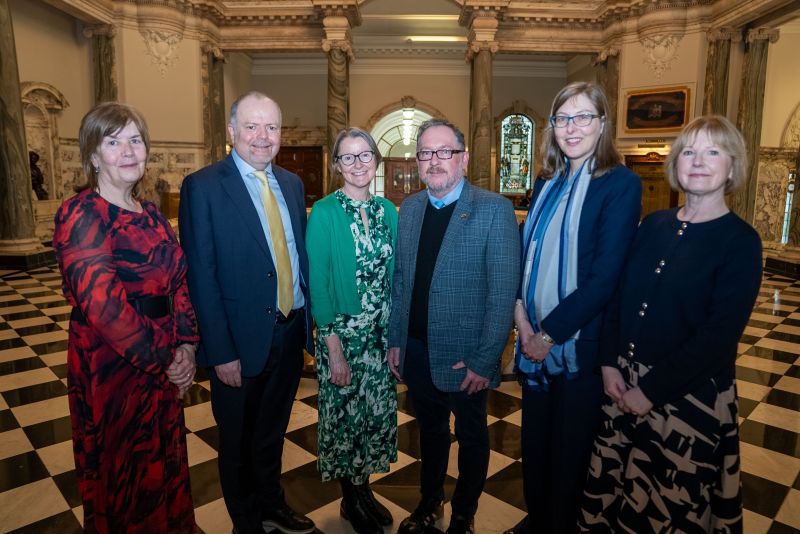
ARK, the Northern Ireland social policy hub, celebrates its 25th anniversary in 2025. Based across the campuses of Ulster University and Queen's University Belfast, ARK provides robust and independent evidence to support knowledge-based policy and a healthy civic society. Friends, funders, stakeholders and staff past and present, gathered at Belfast City Hall in February for the launch of ARK's 25th anniversary programme of events.
As well as hearing from senior staff at both Queen's and Ulster universities, ARK Co-Directors Paula Devine (left, Queen’s University) and Ann Marie Gray (right, Ulster University) highlighted ARK’s key achievements. Ann Marie noted that they have not shied away from challenging issues or difficult conversations. Through working in partnership across academic disciplines and with civil society, ARK has ensured that academic evidence has informed policy debate and contributed to legislative change. In addition, the general public have been important collaborators with ARK’s research, and 133,606 people have completed one of ARK’s public attitudes surveys.
Paula highlighted that information is now much more accessible than when ARK began in 2000. However, in an era of disinformation and misinformation, it is more important than ever that people have access to independent and robust evidence. Denise Hayward (third left, Volunteer Now) discussed her collaboration with ARK, which focused on young people’s experiences, attitudes and motivations in relation to volunteering. Claire Archbold (second left, The Executive Office) noted the importance of ARK survey and research information in the development and monitoring of the Strategic Framework on Ending Violence Against Women and Girls. A video of the event is available online.
ARK has planned an exciting schedule of anniversary events and publications throughout 2025, from seminars and lectures to workshops and a social enterprise hackathon. For more details click here or sign up here to ARK's monthly newsletter.
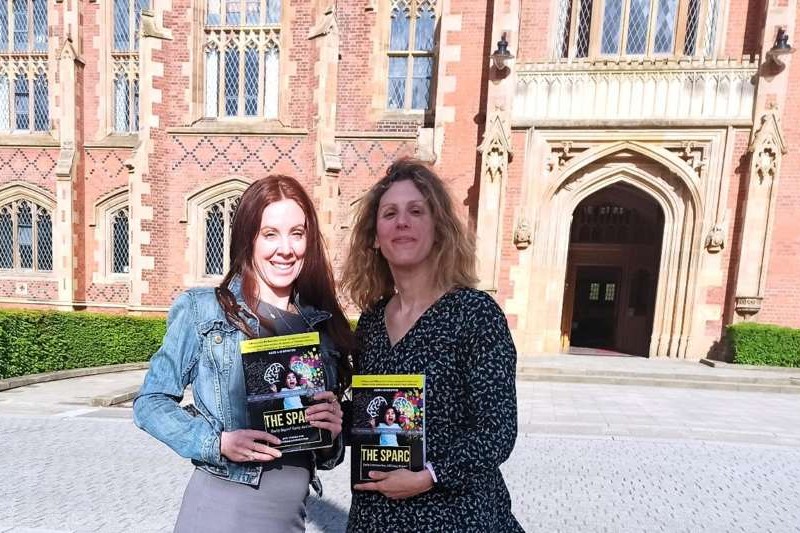
In March, Katerina Dounavi and Amy Tanner launched The SPARC, Α Sequential Parent Curriculum designed for infants and toddlers showing signs of autism or other developmental delays. Their journey began years ago when, as clinicians working with families of children with autism, Amy and Katerina were able to observe the long-term success of children who received early support. When parents knew how to best support their baby or toddler early on, children tended to thrive across all areas of their lives, positively impacting overall family dynamics and fostering good mental health.
This empirical knowledge needed to be tested through research, and this is what Amy Tanner (left) did during her doctoral studies at Queen's University Belfast. After countless hours of collaborative research and dedicated effort, working alongside families of babies and toddlers exhibiting signs of developmental delays, the first study by Katerina and Amy on the effectiveness of a parent-mediated verbal behaviour intervention on maximizing the potential of infants at-risk for autism was published, one of very few international studies. It can be accessed free on the publisher's website. Their study ‘The Emergence of Autism Symptoms Prior to 18 Months of Age: A Systematic Literature Review’ was also published.
The SPARC is a curriculum that guides parents on how to create fun and engaging everyday moments that not only build a bond with their child but also boost their brain development. It is based on science but written with parents in mind, empowering them to recognize early signs and support their child's development through easy to implement everyday experiences. It is designed to help parents translate the love and devotion they already offer their children into concrete, enjoyable activities that will boost development. The book is available to buy at this website.
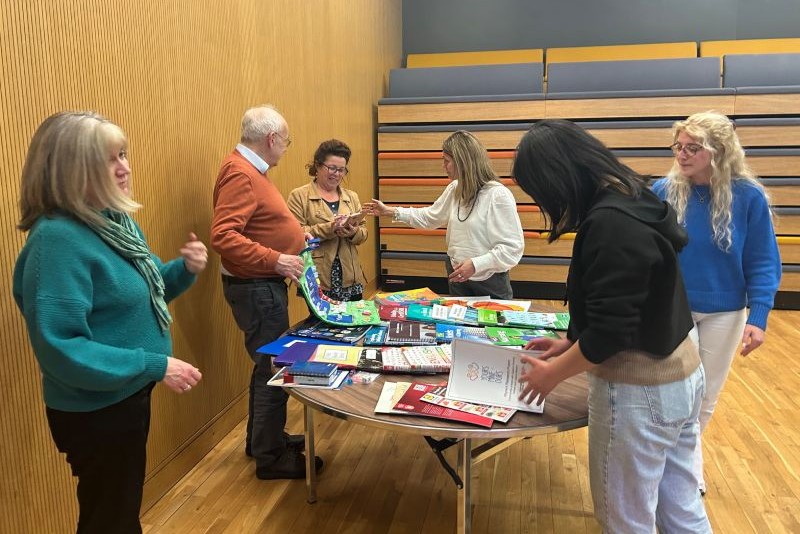
‘Show and Tell’ was a roadshow project facilitated by Queen’s University Belfast and the Belfast Unemployed Resource Centre. Colleagues from our Centre for Language Education Research delivered five regional training and development workshops across Northern Ireland in March and April, designed specifically for groups who provide non-formal English classes to migrants, refugees, and asylum-seekers within community and voluntary sectors across the region.
The ‘Show and Tell’ workshops aimed to: share successful approaches to non-formal language education in community contexts; discuss challenges encountered in non-formal language education in community contexts; and identify practical ways to enhance experiences of non-formal language education in community contexts.
Each workshop lasted two hours, incorporating plenary talks with experienced practitioners and interactive group discussions to build knowledge of practices and resources. A summary report will be made available shortly on the Centre for Language Education research website, to share the learning gained through the workshops, signposting and networks.
The community and voluntary sectors in Northern Ireland have long provided non-formal and informal language classes to meet the socially embedded communicative needs of migrants, refugees and asylum-seekers. Yet opportunities for community groups to experience training, receive support, and share good practices within their local areas are scant. Through these regional workshops our Centre for Language Education Research colleagues support and sustain non-formal language education initiatives in community contexts, which continue to empower some of the most vulnerable in our communities.
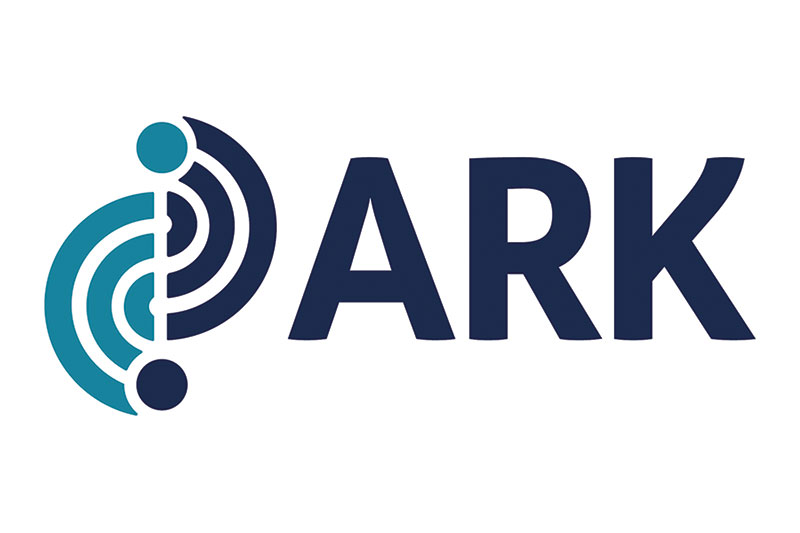
March saw the Visualising Age event, organised by Gemma Carney and Sian Barber of the Queen’s on Ageing research network. It featured papers exploring gender and ageing in film and TV, as well as highlighting the importance of arts and humanities approaches to understanding ageing. Speakers included Professor Justine McGovern (City University New York), Sian Barber (Queen’s University Belfast), Neasa FitzPatrick (University College Cork) and Camilla Zampolini (Queen’s University Belfast).
ARK’s three annual surveys continue to provide independent and trusted data on public attitudes to key social issues.
A report by Katy Hayward and Paula Devine explored public attitudes to different groups of people coming to live in Northern Ireland. One key finding was that as net immigration to Northern Ireland has increased, respondents to the Northern Ireland Life and Times (NILT) survey became more supportive of the role of migrant workers, and less likely to want to see the level of immigration reduced.
Gender-based violence was the theme of two new reports. Based on data from the 2024 Young Life and Times survey of 16-year olds, Martina McKnight and Dirk Schubotz reported that young women feel less safe in public places and online spaces than young males do, and were more likely to perceive potential barriers to reporting gender-based violence. A report by Paula Devine and Martina McKnight found that participants in the 2023 NILT survey were more likely to report gender-based acts of violence to their spouse, partner, close family or friend than to the police.
In March, Jonny Hanson organised a policy roundtable focusing on ethnic diversity and environmental leadership, in conjunction with the African and Caribbean Support Organisation Northern Ireland. While environmental challenges have started to receive policy attention, there is little mention of ethnic inclusion within these. The event brought together a range of stakeholders to discuss these challenges and opportunities.
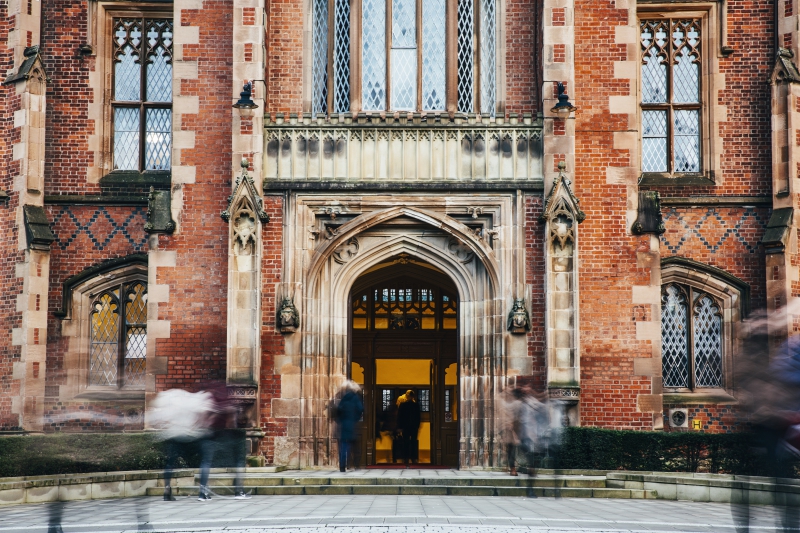
A new Memorandum of Understanding (MoU) between Queen’s University Belfast and Masaryk University in the Czech Republic builds on the Centre’s impactful community outreach work in advancing research and education in autism. This long-standing partnership between our two universities is based on the common commitment to bring evidence-based support services to autistic children, adults and their families. The MoU creates opportunities for colleagues to work together in terms of teaching, research and community impact on a wide range of issues.
Professor Karola Dillenburger was elected Fellow of Association for Behaviour Analysis-International (ABAI). The ABAI Fellow designation recognises outstanding contribution by ABAI’s most distinguished members in research/scholarship, professional practice and/or teaching/administration/service. Karola’s ABAI appointment was recognised at the 51 Annual Convention in Washington DC and on the Fellows page of the ABAI website.
Karola Dillenburger was elected President of the European Association for Behaviour Analysis (EABA). EABA includes a large network of universities, research centres and Affiliated Chapters to ensure accurate and reliable dissemination of conceptual, experimental and applied behaviour analysis. EABA nurtures high quality research and education and professional recognition of behaviour analysts throughout Europe. EABA convenes bi-annual conferences, with EABA2026 planned in Bucharest, Romania.
Karola Dillenburger was invited keynote speaker at the International Conference on Applied Behavior Analysis – Philippines (ICABAP 2025). She presented her research evidencing that autistic families are much more likely to experience marginalisation, poverty and exclusion than families not affected by autism. She shared examples from the freely available multimedia online resource Simple Steps which was developed by parents in collaboration with international Behaviour Analysts, including colleagues from our Centre for Behaviour Analysis.
